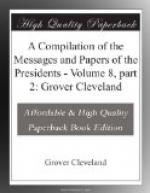schooling. After the first term he asked and
needed no aid from home; he had reached the point
where he could support himself. Was converted
under the instructions of a Christian preacher, was
baptized and received into that denomination.
As soon as he finished his studies in Chester entered
(1851) the Hiram Eclectic Institute (now Hiram College),
at Hiram, Portage County, Ohio, the principal educational
institution of his church. He was not very quick
of acquisition, but his perseverance was indomitable
and he soon had an excellent knowledge of Latin and
a fair acquaintance with algebra, natural philosophy,
and botany. His superiority was easily recognized
in the prayer meetings and debating societies of the
college, where he was assiduous and conspicuous.
Living here was inexpensive, and he readily made his
expenses by teaching in the English departments, and
also gave instruction in the ancient languages.
Entered Williams College in the autumn of 1854, and
graduated with the highest honors in the class of
1856. Returned to Ohio and resumed his place
as a teacher of Latin and Greek at Hiram Institute,
and the next year, being then only 26 years of age,
was made its president. The regulations and practices
of his church, known as the Christian Church, or Church
of the Disciples, permitted him to preach, and he
used the permission. He also pursued the study
of law, entering his name in 1858 as a student in
a law office in Cleveland, but studying in Hiram.
Cast his first vote in 1856 for John C. Fremont, the
first Republican candidate for the Presidency.
Married Lucretia Rudolph November 11, 1858. In
1859 was chosen to represent the counties of Summit
and Portage in the Ohio senate. In August, 1861,
Governor William Dennison commissioned him lieutenant-colonel
in the Forty-second Regiment Ohio Volunteers.
Was promoted to the command of this regiment.
In December, 1861, reported to General Buell in Louisville,
Ky. Was given a brigade and assigned the difficult
task of driving the Confederate general Humphrey Marshall
from eastern Kentucky. General Garfield triumphed
over the Confederate forces at the battle of Middle
Creek, January 10, 1862, and in recognition of his
services was made a brigadier-general by President
Lincoln. During the campaign of the Big Sandy,
while Garfield was engaged in breaking up some scattered
Confederate encampments, his supplies gave out and
he was threatened with starvation. Going himself
to the Ohio River, he seized a steamer, loaded it
with provisions, and on the refusal of any pilot to
undertake the perilous voyage, because of a freshet
that had swelled the river, he stood at the helm for
forty-eight hours and piloted the craft through the
dangerous channel. In order to surprise Marshall,
then intrenched in Cumberland Gap, Garfield marched
his soldiers 100 miles in four days through a blinding
snowstorm. Returning to Louisville, he found that
General Buell was away; overtook him at Columbia, Tenn.,




